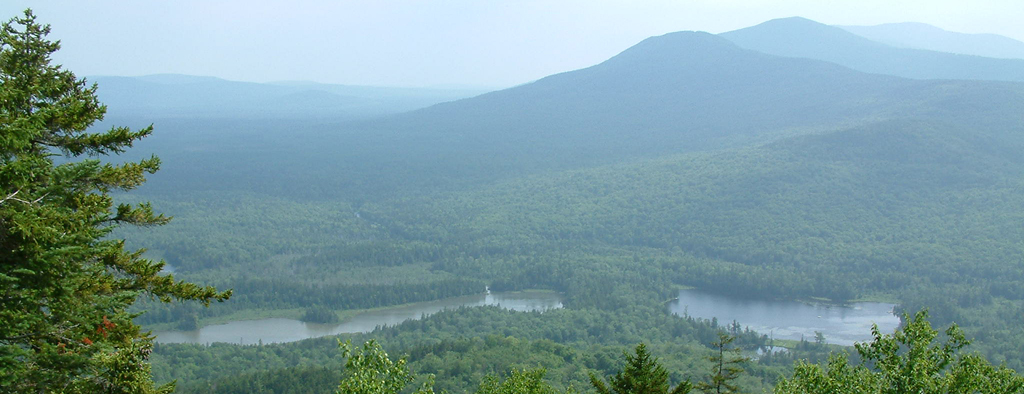
Carbon Markets Can Support Healthy Rivers
Christine Yankel, on behalf of The Climate Trust
As published by The Freshwater Trust – December 2014
Carbon markets may not be top-of-mind for a visitor casting for brook trout in the clean, cold water of the West Branch of the Pleasant River in Maine, or crunching leaves underfoot hiking neighboring fragrant, forested hills of black spruce, balsam fir, birch, and maple, but the market merits a thought. After all, carbon offset sales helped the Appalachian Mountain Club (AMC) protect the forest, wetlands, and streams in the Katahdin Iron Works Ecological Reserve, and provide an incentive that supports the protection and restoration of forests nationally and globally. These forests, in turn, filter and store water, prevent erosion and run-off, shade and cool water—making their function vital for the establishment of healthy rivers and watersheds. So, how does the carbon market work to support healthy waterways?
What is a Forest Carbon Offset?
As forests grow, trees absorb carbon dioxide from the atmosphere in their growing trunks, branches, leaves and roots. A forest carbon offset is equivalent to a metric ton of carbon dioxide sequestered in a forest, measured and qualified according to rules that ensure that the climate benefit is real and lasting. Offsets are purchased by greenhouse gas emitters to compensate for emissions they cannot reduce internally. Because buyers want to ensure that offsets produce a genuine climate benefit and are of high quality, most offset projects are developed and certified using a recognized voluntary or compliance carbon standard. Offsets may be produced by reforestation, through protection of forests threatened by conversion to other use, or by improved management practices that increase stored carbon.
Carbon and Conservation
For AMC, carbon offset sales provide important revenue to help conserve wilderness and water. As part of their Maine Woods Initiative, AMC acquired and permanently protected 66,500 acres of forest land in the 100-Mile Wilderness region of Maine. On the 37,000 acre Katahdin Iron Works property—an area that was formerly industrial forest—AMC set aside 10,000 acres as a permanent ecological reserve where no timber harvesting will take place and the forest will be allowed to grow naturally.
Additional areas were set aside to protect riparian areas and unique wetlands like Caribou Bog. The remaining area is managed using sustainable forestry techniques. These forests protect six miles of the West Branch of the Pleasant River, an important natural resource that supports a native brook trout fishery, several remote ponds valued for paddling and fly-fishing, and numerous wetlands. Together, carbon offsets and sustainable timber harvesting keep this forest as forest, and help protect a valuable watershed.
AMC’s carbon offsets were verified under the Forest Project Protocol of the Climate Action Reserve, a voluntary standard. The protocol requires AMC to demonstrate that the offsets are permanent, verifiable and “additional.” Additionality necessitates that the offset provides a benefit above and beyond what would have happened without the project.
AMC is committed to continued monitoring and verification of the project to ensure that its climate benefits persist for a period of 100 years following issuance of any carbon offsets. The protocol also includes standards to ensure the project is sustainably managed and that ecological co-benefits, such as wildlife habitat and soil and water quality, are maintained.
“We see carbon credits as having the double benefit of supporting our overall climate policy by reducing atmospheric carbon, and providing financial support to conservation projects like our Maine Woods Initiative,” said Walter Graff, Senior Vice President of AMC. “We are pleased to be among the early users in the conservation community of forest carbon credits to support land conservation in New England.”
Forests Work for Communities, Water, and Climate
Providing new revenue to permanently conserve forests—either as reserves or as sustainably managed areas—is not the only way carbon offsets encourage healthy forests and watersheds. Carbon offsets facilitated the planting of millions of trees in the floodplains of the Mississippi and other rivers, and supported improved management that integrates sustainable timber harvest with riparian and habitat restoration in working forests. Offsets also provide multiple revenue streams to implement management that develops strong, resilient forests and healthy waterways at a larger, landscape scale.
Globally, carbon finance impacted nearly 28 million acres of forests in 2012. New methods are being tested to provide incentives that support protection and restoration of wetlands as well. However, challenges remain. Restoration and conservation can be costly and carbon project transaction costs can be high. With the myriad of non-carbon benefits that healthy forests provide, finding new ways to provide incentives to forest owners and managers to take part in these efforts could help advance even more impactful projects. Still, despite challenges, carbon offsets are already helping make forests greener, and streams cleaner, for trout in Maine and people around the world.